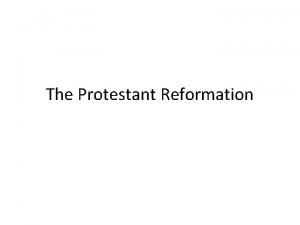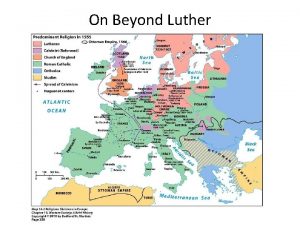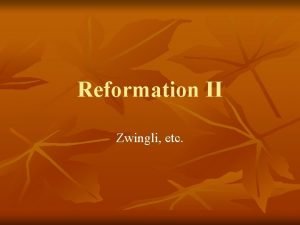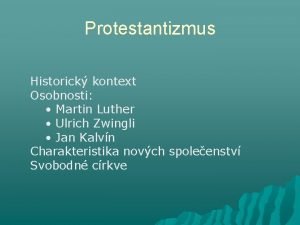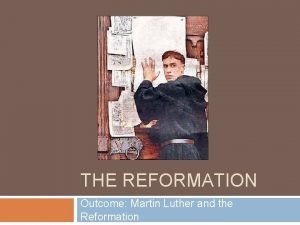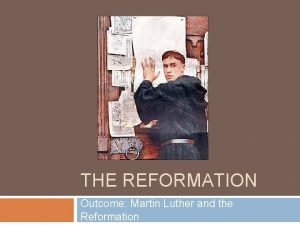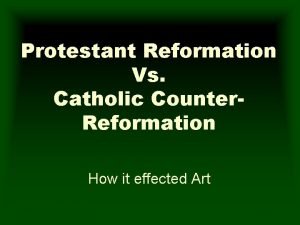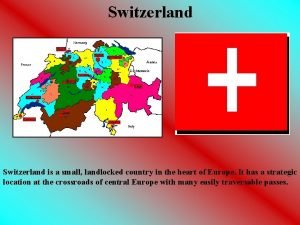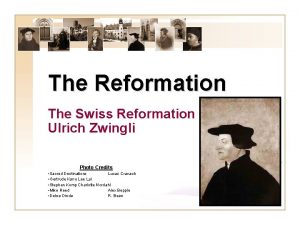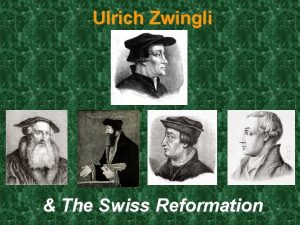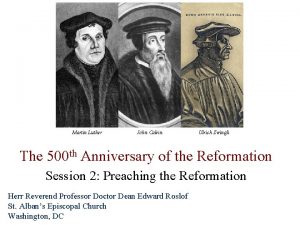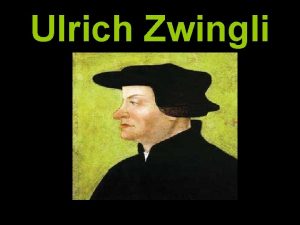ULRICH ZWINGLI AND THE REFORMATION IN SWITZERLAND The













- Slides: 13

ULRICH ZWINGLI AND THE REFORMATION IN SWITZERLAND

The Swiss Confederation

Ulrich Zwingli Born in 1484 (3 months after Martin Luther) � Became a parish priest at age 22; became a chaplain for the papal army � 1516 – begins studying Erasmus’ translation of the Greek New Testament � 1518 – becomes preacher at large church in Zurich � � Announces that he will preach through Matthew � 1519 – nearly died of the plague

Reformation in Zurich � Zwingli was more cautious than Luther �Agreed that reform must come by the Word of God changing hearts, not force The pope relied on mercenary soldiers from Switzerland � 1522 – 67 Theses – covered most areas of Reformation theology and practice � 1523 – Zwingli wins debate with opponents; begins training preachers �

Zwinglian Reforms Similar to Lutheran reforms, except in regard to worship � Strict regulative principle – nothing except what is commanded by Scripture � � Plain buildings – no pictures, statues, etc. � At first, only Bible reading, prayer, and preaching; later Psalm singing is added (without instruments)

Marburg Colloquy Called by Phillip of Hesse to unify the Protestants (Zwinglian and Lutheran) � Different views of the Lord’s Supper � � Catholic – transubstantiation � Lutheran – consubstantiation � Zwinglian – memorial / spiritual presence � Luther – “This is My body” – no compromise

Division in the Swiss Confederation 1531 – five Catholic cantons attack Zurich; Zwingli leads Zurich armies � Armies of Zurich slaughtered; Zwingli killed � One month later – Peace of Kappel is signed – each canton to chose its own religion � Henry Bullinger takes Zwingli’s position � � Writes 1 st and 2 nd Helvedic Confessions

The Anabaptists A loose and varied movement to “reform the Reformation” � “Ana-baptists” – “re-baptizers” � Common teachings: � � Adult baptism – reaction to state churches � Separation from the world – no cooperation with the state; stand apart from culture; communal living; no private property � Pacifism – no resistance to force; no service in military; paid no taxes for military � Individualism – emphasis on individual decision in salvation and in theology; aversion to creeds

Thomas Muntzer A contemporary of Luther; started as a Lutheran, but became Anabaptist � A fiery, apocalyptic preacher � � Said “inner word” was superior to the “outer word” (Bible) � Unlike other Anabaptists, he advocated taking up the sword to usher in End Times � Captured, tortured, & beheaded during The Peasant Wars in Germany

Conrad Grebel Leader of Anabaptists in Zurich � 1525 – loses a disputation with Zwingli and Bullinger � � City council requires all children to be baptized � Grebel and other leaders baptize adults and offer the Lord’s Supper – break with the Lutheran church � Catholic church, most of Lutheran states, and city of Zurich all condemn Anabaptists to death (often by drowning)

Munster � 1534 - city in NW Germany that comes under control of Anabaptists – “The New Jerusalem”, where Armageddon would begin � All who refuse adult baptism forced to leave � Jan van Leiden – has himself anointed as “King David” � Allows polygamy and enforces communal property � Death penalty for refusing adult baptism and trivial offenses � 1535 – combined Catholic. Lutheran army lays siege and is let in by disgruntled citizens

Hutterites � � Moravia gives toleration to Anabaptists Jakob Hutter – led the formation of “Bruderhofs” (“brother-houses”) – total communal living in multiple buildings � “In the time of peace between 1564 and 1619 the Hutterites of Moravia became celebrated, for they could manufacture the best objects at a lower price than was possible elsewhere. ” Owen Chadwick � Confession of Schleitheim – practical issues, little theology

Mennonites Menno Simons - born in 1496 in Holland; became a Catholic priest � Drawn to Anabaptist teaching, but his brother died in massacre at Munster � � Wrote “The Blasphemy of Jan van Leiden” � “The Calvin of the Anabaptist Movement” � Emphasis on separation, simplicity, pacificism � Community-oriented, but not communal
 Ulrich zwingli was a leader of the reformation in ______.
Ulrich zwingli was a leader of the reformation in ______. Fickle
Fickle Ulrich zwingli nationality
Ulrich zwingli nationality Ulrich zwingli
Ulrich zwingli Ulrich zwingli
Ulrich zwingli Marburské spisy
Marburské spisy The reformation outcome martin luther and the reformation
The reformation outcome martin luther and the reformation The reformation outcome martin luther and the reformation
The reformation outcome martin luther and the reformation Protestants vs catholics
Protestants vs catholics Thermal bath vals
Thermal bath vals Swiss point middle school
Swiss point middle school Switzerland landlocked
Switzerland landlocked Which continent is switzerland
Which continent is switzerland Polenbear
Polenbear
